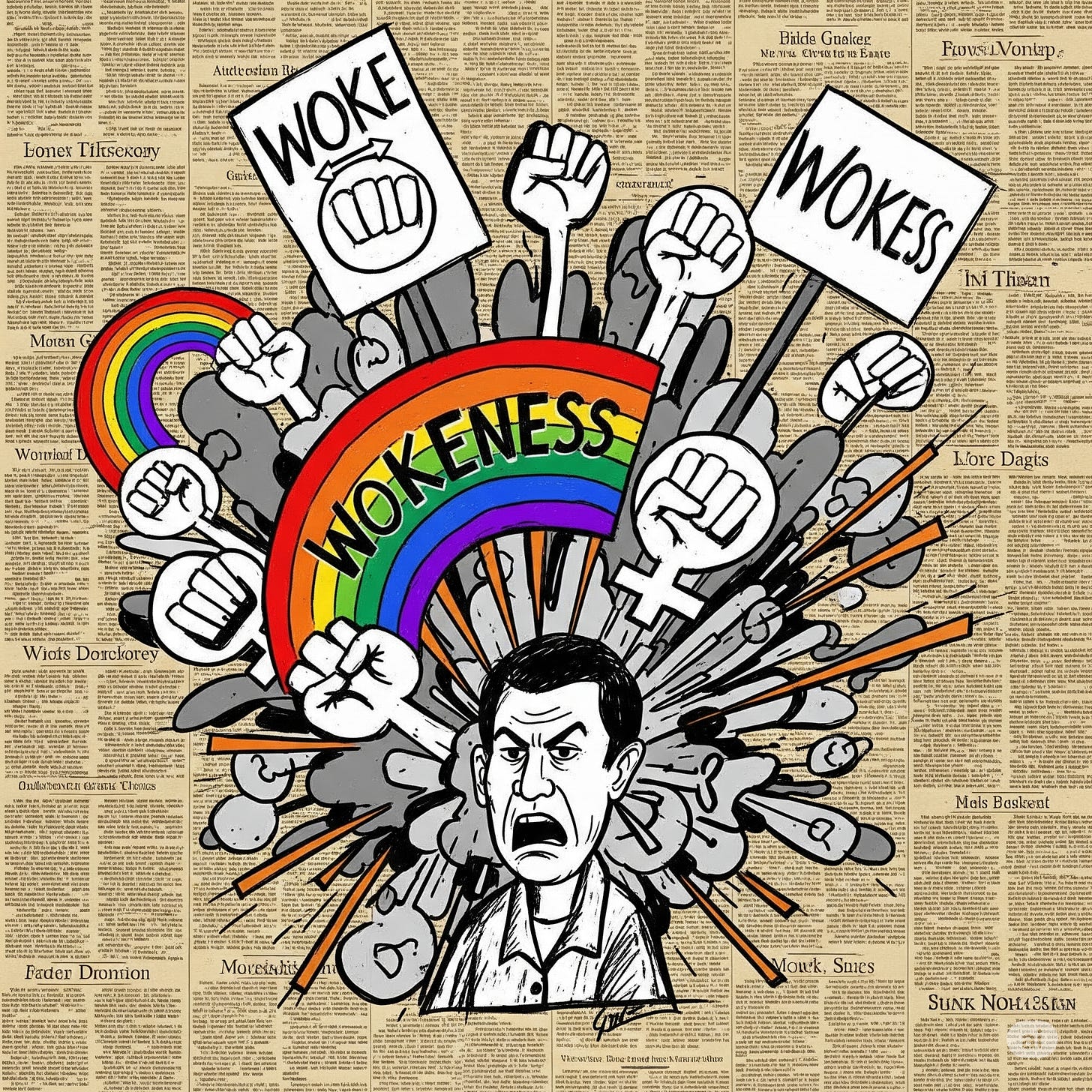‘Woke Activist DESTROYED’: The Limits of Fighting Wokeness
How Wokeness is Becoming the Christianity of Our Time
In the digital age, content is curated with clinical precision. Algorithms mine your data—bought and sold by countless firms—to tailor suggestions aimed at maximizing engagement. Yet, occasionally, content outside your usual scope appears. The algorithm watches your watch time, fine-tuning its next move.
Lately, my feeds have been increasingly saturated with videos titled something along the lines of “Joe Rogan Reacts to…” – followed by the inevitable “Destroys Woke Activist.” This trend is more than just tiresome clickbait. It’s misleading, often manipulative, and misrepresents both the subjects of these videos and, frankly, Rogan himself—who couldn’t possibly have time to react to the volume of clips being attributed to him.
One example features a member of the public confronting a Just Stop Oil protestor. In the video, the so-called ‘debate’ is one-sided – the protestor is barely heard, while the public speaker’s criticisms are elevated and uninterrupted. The video includes a reference to a protestor gluing their hand to the road, used not by the activist, but as an example by the critic to discredit the movement, painting the entire cause as irrational or performative so they may seek their martyrdom.
What once was, now is again: Parallels in the Past.
The selective framing of this type of content, driven by narrative control and algorithmic reinforcement, reminded me of a very different kind of distortion – one explored in Catherine Nixey’s The Darkening Age. In Chapter 6, Nixey details how early Christians deliberately sought martyrdom to attain spiritual glory in the afterlife. Their actions were so fervent that they often demanded execution from Roman governors, becoming both a nuisance and a spectacle to the public. At the same time, Christian groups destroyed countless pagan artifacts – statues, temples, and cultural symbols – eroding nearly a millennium of Greco-Roman religious tradition in the name of spiritual revolution.
Many Romans engaged in debates with early Christians, though they often regarded such efforts as unproductive. Figures like Tacitus, Suetonius, and Pliny the Younger viewed Christianity not just with suspicion but as a genuine threat to Roman public order and religious tradition. Tacitus helped shape Nero’s intense hostility toward Christians, while Pliny the Younger, as governor of Bithynia and Pontus, described the movement as a “corrupt and immoderate superstition,” criticizing its erosion of traditional Roman values and its impact on civic cohesion. In a similar vein, critics of the woke movement find themselves in the same situation to that of Pliny or Tacitus – the woke arguments are logically incoherent, flawed and overzealous.
The Loss of Heritage: Cultural Erasure and Control.
To highlight another point of Nixey’s is how knowledge was constricted and controlled by the early Christians – the early Christians had also decimated the Library of Alexandria. The cultural and intellectual hub of the known world at that period, burnt down in the name of God, said to contain between 40,000 and 400,000 books – some scholars estimated it could have been up to 700,000. While it has been said to take heavy damage after Julius Caesar’s siege of the city of Alexandria – apparently on accident – The early Christians had defaced many of the statues inside the library, while it is debatable if they had destroyed any of the books.
In today’s world, critics are often silenced for expressing views that challenge the mainstream ‘woke’ narrative. Some argue that the rise of the alt-right is not a random phenomenon, but a reaction to what many see as the excesses of a modern left that has strayed from its core values. Yet, in turn, the woke movement itself can be seen as a response to decades of neoliberalism, unchecked free-market policies, corporate lobbying, and an increasingly authoritarian shift in Western governance – forces that have had a profound and often harmful impact on individual lives.
I often wonder where we might be today if those ancient works had survived. Alas, the contents of the great library were burned, stolen, and lost over time. It’s even argued that some Greek philosophical texts – such as Aristotle’s Metaphysics and Plato’s Republic – were preserved and later integrated into Christian theology. Thinkers like St. Thomas Aquinas, for example, adapted Aristotle’s ideas into a more Christian framework.
The Modern Day: Piety without a God.
Both cases – ancient and modern – highlight how ideological conviction, paired with powerful systems of dissemination, can distort narratives and suppress dissent. The early Christians, driven by spiritual fervour, redefined cultural norms and erased competing voices; today's digital landscape echoes that, where algorithms and tribal discourse often reduce complex issues to binaries and soundbites.
We seem to be entering a new era of piety – one not rooted in religion, but in ideology – gradually eroding long-standing values and frameworks that have shaped society for millennia. Much like the Romans witnessing the rise of Christianity – and the decline of their own culture, religion and heritage – we are seeing a slow-burn, methodical shift in norms, evolving over time and often enforced not by law, but by cultural momentum.
Yet within this change lies a paradox: the ‘woke’ movement, frequently criticized for its extremes, began as a call for justice, equity, and historical reckoning. The tension isn’t in its origin, but in how movements – ancient or modern – tip from reform to orthodoxy, and in how they treat dissent as they gain ground.
Much like Christianity had taken power over hundreds of years, we must question where our values belong in today’s age for a better, and just, future.


